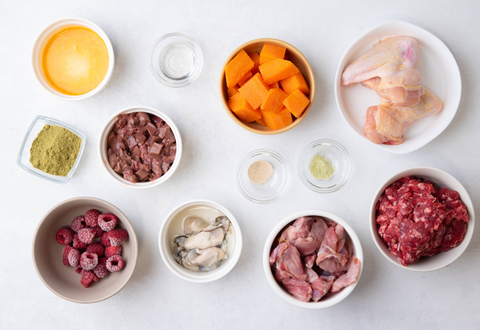
How To Support A Dog With Food Sensitivities
Supporting your sensitive dog
Sometimes dogs don’t actually have specific intolerances or triggers but are just generally sensitive creatures.
This may be due to their breed – French bulldogs are notoriously sensitive, for example – or genetic predisposition.

It could be due to the food they were weaned onto and the health of their mother – much of the gut microbiome is either inherited or developed when puppies are very young, so this can have long term influence on their health. And some of it is probably just luck.
If your dog falls into the “generally sensitive” category, a whole foods diet and focus on preventative wellness can go great lengths to managing recurrent symptoms and bouts of illness.
At Healthy Active Pet, our team of pet nutritionists have created a sensitive dog program that is 100% designed for dogs with sensitive tums! You can check it out here

This program isn’t a replacement for regular veterinary care by any means, and we always encourage you to have regular check-ups and seek treatment whenever required.

But we also believe there is great value in focusing on staying well, rather than waiting for symptoms to emerge and then treat.
Through a combination of adopting a whole foods approach to nutrition, focusing attention on the health of the gut, making efforts to support the immune system, and staying mentally engaged and physically active, we promote good health and can often make great progress towards reducing the presentation of preventable illnesses and discomfort in our animals.
Check the sensitive program and recipes here

Benefits of fresh foods
The reality is most of us still feed our dogs a “traditional” diet of heavily processed food, often based upon the recommendation of our care providers.
It’s a strange situation to find ourselves in and it goes against everything we’re told about how to support our own health and nutrition.

In reality, the benefits of feeding our dogs fresh foods brimming with wonderful things like organic nutrients, digestive enzymes, pre and probiotics and antioxidants is not just common sense, but it is also supported by evidence.
In 2020 the University of Florida conducted a large survey that clearly found dogs eating a processed dry or canned diet were more likely to be overweight or obese than those eating fresh foods, such as home cooked or commercial raw food.
Perhaps even more significantly, researchers at a teaching veterinary school in Finland found that dogs fed raw food have lower levels of inflammation and disease markers, regardless of whether they are overweight or not.
This is troubling for the dogs eating processed food because chronic inflammation is widely understood to be a precursor to a vast number of diseases.
Gut Health
The health of the gut is paramount to any effort at improving overall heath A New Zealand study published in 2017 found a clear link between gut microbiome diversity with intestinal health.
It also found that kibble fed dogs had increased levels of bacteria associated with diarrhoea and irritable bowel, whereas the raw fed dogs in the study experienced greater gut microbiome diversity and improved nutrient digestibility.
The makeup of the microbiome is critically important to overall health, given that the immune system is primarily thought to reside in the gut.
In this sense, the health of the gut and the health of the immune system are really one and the same; without a healthy gut it is virtually impossible to have a healthy immune system.
Despite all of this, so much commercial pet food is loaded with heavily refined carbohydrates, poor quality and degraded meat meals, oxidised fats, synthetic vitamins and cheap, poorly absorbed minerals.
This food is dehydrating and doesn’t promote health; it promotes inflammation, gut dysbiosis, and the very ailments we seek to prevent.
What's in commercial pet food?
Have you ever picked up a bag of dog or cat food and seen "Meat by-products and meat (poultry, beef &/or sheep)” or words to that effect? What does that even mean?
Chances are it means the manufacturer doesn’t actually know which one is in their food which can mean it is very hard to buy for a dog with food allergies (And this is one of the driving reasons we created our freeze dried and air dried range to be free from chicken and beef and to say EXACTLY what is in it!)
Heavily processed pet food like kibbles and tinned dog and cat products are almost always made from meat that has either been rendered to a shelf stable powder, or otherwise processed to a meat “slurry” that is then sterilised.
Rendering is a process favoured by the fertiliser industry, whereby meat and bones that are not fit for human consumption are crushed and then heated to very high temperatures until the water and fat separate.

The remaining “meat” is dried to a long life powder that contains mostly protein and bone, and then turned into garden fertiliser, dry dog food and livestock feed.
Some tinned pet foods also use these meat meals, while others grind whole meat and meat by-products (which may include heads, hooves, offal and basically any part of the animal that is otherwise discarded), and then add cereals and other binding ingredients to form the chunks in a tin that we might mistake for actual pieces of meat.
These ingredients are then cooked so the starches gelatinise and proteins begin to denature, before being tinned and sterilised using temperatures over 120 degrees Celsius for several minutes.
These products are basically always synthesised with vitamin and mineral supplements, because very little nutrition survives these heat intensive processes.
Because these meats are pretty much always not of a quality fit for human consumption, prior to being turned into pet food they are regulated by a different set of rules to food intended for the human supply chain.
These rules don’t require that meat be properly labelled as “beef” or “sheep,” which is why pet food manufacturers don’t always seem to know which one is in their food.
There are of course brands that do name their meats, and we can only give them the benefit of the doubt that this is because their sourcing ensures these claims are accurate, but the intensive processing methods remain the same, meaning that nutritionally there is very little difference between them by that point anyway.
Another thing you will see in pretty much all processed pet foods is high levels of carbohydrate ingredients. These may be mysterious “cereals” in cheaper brands (usually wheat, corn, soy or some combination of all three), or things like brown rice, peas, lentils, chickpeas, tapioca, potato, sorghum and beet pulp in the higher end brands.
These may sound ok, probably because we know these whole foods are nutritious additions to our own diet. But dogs and cats have no nutritional need for carbohydrates, and these are not actually present in their whole food form like the pretty pictures on the label might suggest; they are ground down to highly refined starchy powders that act as fillers and binders, without which these product would not hold together.
They also often appear spread across multiple different ingredients (a practice known as ingredient splitting), which serves to conceal that many processed dog and cat foods are upwards of 50% carbohydrates.
For animals that don’t need any carbs in their diet, that’s a whole lot of carbs!
You can see our FAQ's on raw feeding here
The best way to avoid these mystery meats and processed cereals is to feed your four-legged friend a whole food diet, either in the form of homemade food using the same nutritious ingredients you would eat yourself,(you can see our pet nutritionist created meal plans and recipes here) or a reputable pre-made food that has been minimally processed and is clearly labelled with everything it contains (you can see our raw air and freeze dry foods here which are free from chicken & beef)

Or you can get full access to our sensitive meal plan programs and raw food recipes here

